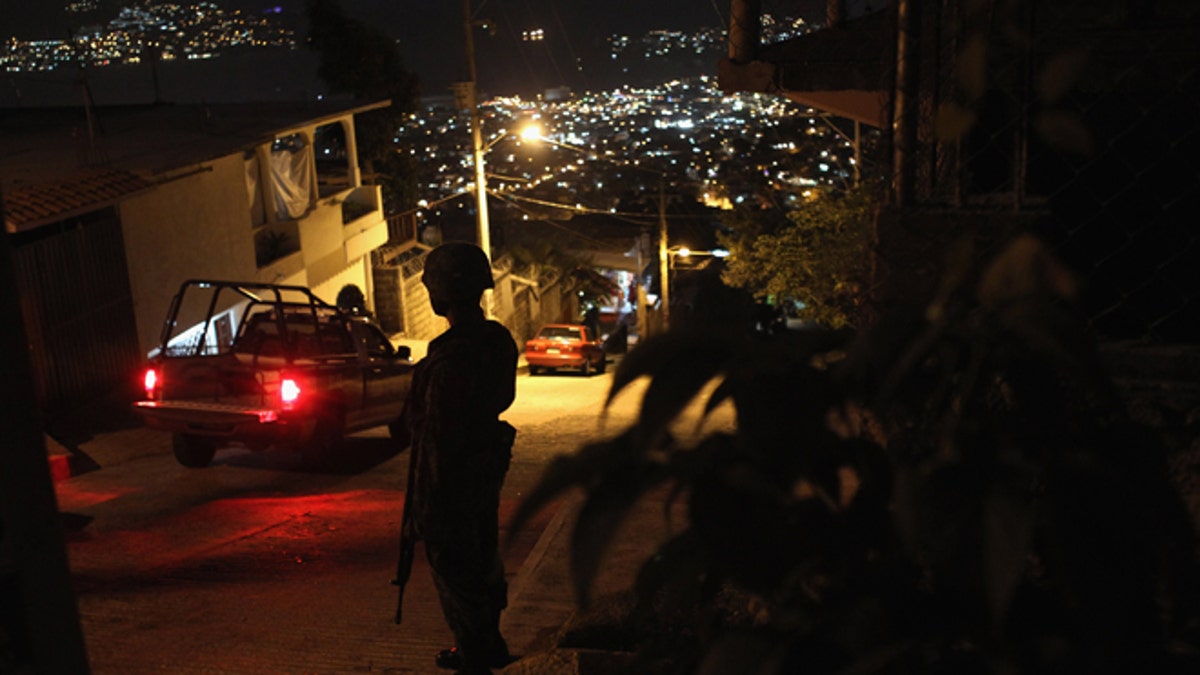
ACAPULCO, MEXICO - MARCH 03: A Mexican army soldier stands guard at a suspected drug-related murder site March 3, 2012 in Acapulco, Mexico. A forensics team excavated five corpses from the floor of an abandoned house. Officials said the five victims were apparently buried alive in concrete. Drug violence has surged in the coastal resort in the last year, making Acapulco the second most deadly city in Mexico after Juarez. One of Mexico's top tourist destinations, Acapulco has suffered a drop in business, especially from foreign tourists, due to the violence. Toursim accounts for about 70 percent of the economy of Acapulco's state of Guerrero and 9 percent of Mexico's economy. (Photo by John Moore/Getty Images) (2012 Getty Images)
With an estimated 60,000 people dead and violence spreading into once relatively calm regions, México’s new attorney general publicly is voicing what many critics and human rights activists have argued for years: that former President Felipe Calderón’s war on the country’s drug cartels has only worsened México’s problems.
Mexican Attorney General Jesús Murillo Karam said earlier this week that Calderón’s king pin approach to the drug war —i.e. killing or arresting cartel leaders and other high value targets— has only splintered the cartels and spawned many more, smaller gangs who vie for power and access to the lucrative smuggling routes. Murillo Karam estimates that there are between 60 and 80 drug trafficking organizations operating in México today, many more than in 2006 when Calderón declared war on the cartels.
We are all clear that Mexico now demands a country in peace, a quiet country, a safe country.
"It led to the seconds-in-command –generally the most violent, the most capable of killing– starting to be empowered and generating their own groups, generating another type of crime, spawning kidnapping, extortion and protection rackets," Murillo Karam said, according the Guardian newspaper.
The Calderón administration attempted to downplay the effects of the drug war during the previous president’s time in office.
In August, the administration released a report naming eight major cartels operating in the country —the most powerful being Joaquín “El Chapo” Guzmán’s Sinaloa Cartel and the quasi-military Los Zetas respectively— but did admit that the once dominant Beltrán Leyva Cartel had divided into a number of groups following the death of leader Arturo Beltrán Leyva and the arrest of high ranking member Edgar Valdez Villareal, alias “La Barbie.”
During Calderón’s tenure, the government captured 25 of México's 37 most-wanted drug lords in a strategy supported by the U.S. government.
Newly inaugurated Mexican President Enrique Peña Nieto has promised to shift the country’s approach to the drug war, from taking down high value targets to reducing crime – especially homicides – of the everyday Mexican citizens.
The argument is that despite financial resources to fight cartels under Calderón had doubled, crime had increased and the drug gangs had become more violent.
"We are all clear that México now demands a country in peace, a quiet country, a safe country," Peña Nieto said on Monday, according to the Wall Street Jorunal. "This is our main objective."
The new president said that he wants a rural gendarmerie of around 10,000 people to go into areas where the police and army have failed to take control. While the approach was praised by some, it’s a far cry from the 80,000-member corps he promoted on the campaign trail, said Eric Olson, a México analyst at the Woodrow Wilson Center.
"It reflects that reality is setting in that they don't have people sitting idly to join these forces," he added.
Despite his promises of reform, some human rights experts worry that Peña Nieto has not been transparent enough with his plans and needs to reveal more details of his new strategy.
"While it is a good sign that Peña Nieto has committed to prioritizing human rights, the real question is what concrete steps he will take to tackle the lasting problems, like prosecuting widespread abuses by security forces and coming up with a plan to address thousands of disappearances," José Miguel Vivanco of Human Rights Watch told The Wall Street Journal.
Follow us on twitter.com/foxnewslatino
Like us at facebook.com/foxnewslatino
